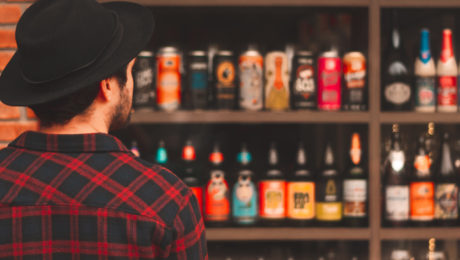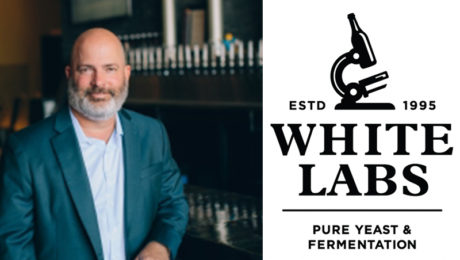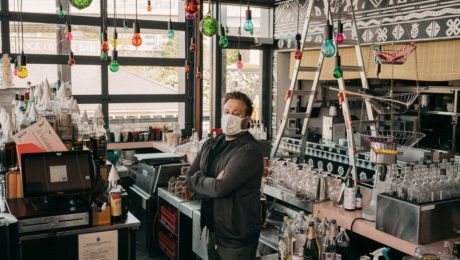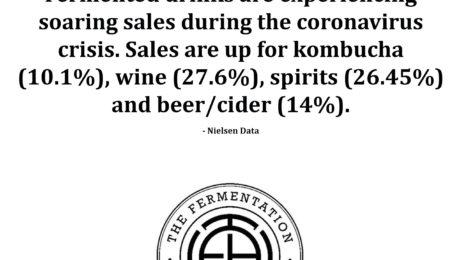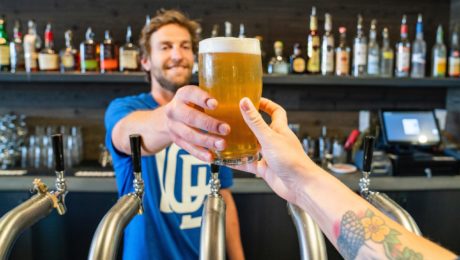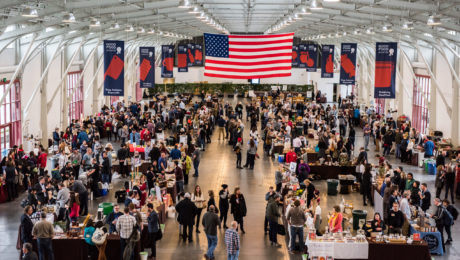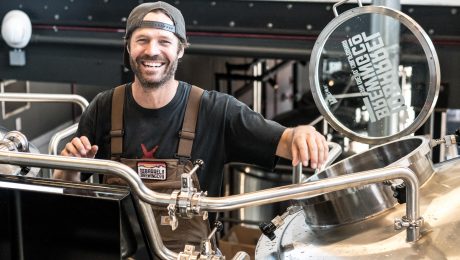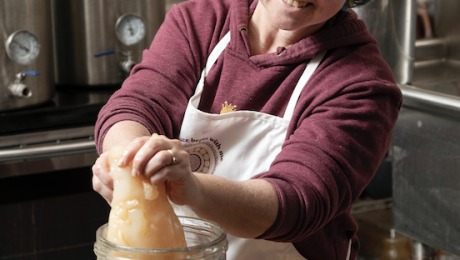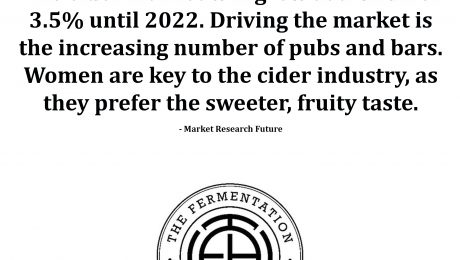Begging for Tax Relief for Alcohol
America’s small, craft beer, wine, cider and mead brewers are teaming up with 57 bipartisan senators to ask Congress to extend relief from excise taxes on alcoholic beverage products. These tax cuts, imposed by President Donald Trump in 2017, will expire at the new year.
The coronavirus pandemic has forced “dramatic declines in revenue” because of the closure of on-premise locations. The Beverage Marketing Corporation estimates up to 30% of craft breweries that existed in 2019 won’t make it through the pandemic. And stats by the Brewers Association show craft drinks make up more than 25% of the $116 billion U.S. beer market.
Read more (Food Dive)
- Published in Business
Q&A with Chris White, White Labs
As a biochemistry grad student with a penchant for homebrewing, Chris White never thought his growing collection of yeast strains would amount to anything outside a hobby. But when White graduated with his PhD and was offered a lucrative job in the biotech field, one caveat kept him from accepting the offer — there were no side jobs allowed.
“I never had some big plan to start a company. But I liked all the fermentation stuff I was doing and didn’t want to let go of my yeasts,” says White, CEO and founder of White Labs. “I said no to the job, and from there White Labs kept going and going and getting bigger and bigger.”
Today, White Labs is a powerhouse in the fermentation industry. They provide professional breweries with liquid yeast, nutrient blends, educational classes, analytic testing and private consulting.
White Labs is celebrating a landmark 25th anniversary this year, despite a global pandemic that has shuttered breweries. They have released their own line of beer, created a new nutrient blend for hard seltzer brands, began a YouTube series and launched free how-to education classes for homebrewers. White Labs will host a year in review webcast on Dec. 9.
“We’ve had a lot of success and we’ve made a lot of mistakes, and we’ve tried to learn from those mistakes. But we’re a team. And we really got lucky that we hired people interested in fermentation that helped build this company,” White says. “Everyone really pulled together during COVID and did whatever was needed. It’s been a great experience because we had solutions and we had teamwork. And I think it’s taken 25 years to get to that team, that tribe.”
A yeast guru, White is a co-author of the book “Yeast: The Practical Guide to Beer Fermentation.” Below, check out our Q&A with White.
The Fermentation Association: You studied biochemistry at University of California, Davis, then got your PhD in biochemistry at University of California, San Diego. What made you decide to dive into yeasts?
CW: I was always interested in science since high school chemistry, and then in college was interested in how cells work, how DNA worked. It drove me to where I am today, really. Most people I went to school with at UC Davis, they were studying biochemistry to be a physician. But that’s not what I wanted to do, I was more interested in biotech and grad school.
Meanwhile, I was homebrewing. It was a great combination of things that happened. The science and homebrewing is what led me to put that together and make yeast for homebrewing, then yeast for craft brewing.
TFA: Is that what led you to start White Labs?
CW: It really was. I like beer. I was fascinated with how it could be made. It’s pretty simple to make beer — simple, but not easy. It’s difficult to make a great beer. But it’s fairly simple since it’s only four ingredients if you include the water. That’s what’s great about a lot of fermentation, the raw materials are all around you. They’re simple. Making it taste good is the hard part, that’s the art of it. I liked beer, I really got into homebrewing, then the people I was making homebrewed beer with started a store in San Diego, Home Brew Mart, in 1992. We became friends and that’s who I was homebrewing with every weekend. Then my friend from the store said “Hey, we need yeast,” and I started a little company on the side to make yeast. It wasn’t like I had some big plan to start a company, I thought I’d just make a little each week. And then other people asked and other people asked. By the time I got closer to finishing grade school, I just didn’t want to stop doing the yeast for brewing.
TFA: Now there are over 1,000 strains of yeast in the White Labs yeast bank. Tell me about it.
CW: We have a yeast bank that I spent a lot of time building in the beginning, more for my own brews, but obviously later on, it became more and more. The foundation of our company is our yeast strains and the way we store them. We’re collecting strains all the time. But what I did in the beginning was collect different strains from travel, from different yeast banks. We created our own private yeast bank at White Labs, but there are yeast banks around the world. Especially in Europe where brewing really began in an industrial way and where yeast was discovered and started to get collected. There’s a great yeast bank in Denmark, Germany, the UK. I spent a lot of time acquiring strains from those.
You get to know the yeast in a different way, the strains, what they do. Performance, conditions. But for beer especially, it’s really how they taste, which is so important. We only make those flavors through fermentation. We still continue to acquire strains. People send them to us, we bank private strains for companies, sometimes they buy them in a liquid form we make for them, sometimes we just store it for them. But usually, they’re banking it for us to make something with it.
TFA: Besides yeast, White Labs offer testing services as well.
CW: White Labs Analytical Lab is really separate in the fact that a lot of people that work in that lab don’t really have anything to do with the yeast. It’s just testing samples. They’re usually fermented beverages. Yes, there’s beer there, but that’s just a part of White Labs Analytical Lab. There’s the spirits that come for testing, kombucha, cider, mead, any kind of commercial business making a fermented beverage that needs some kind of testing. Sometimes it’s regulatory for export. Sometimes it’s just for their own data, like actual alcohol by volume instead of calculated, sometimes it’s microbiology or tracking down a problem or contamination. It’s all confidential, like everything at White Labs. But we get to work with a lot of cool companies, a lot of them may not get yeast from us, that’s really not a requirement. The yeast and testing run separate.
TFA: Have you seen kombucha brewing grow?
CW: Oh yeah. Originally, that’s how we got into analytical testing because people were asking for alcohol lab evaluations, which is so important in kombucha. We all know what happened there (Whole Foods pulled all kombucha bottles off shelves in 2010 after several brands tested at higher alcohol beverage levels then what was printed on the bottles). And it happened because it’s a biological process. You put that thing in a bottle and it’s going to keep fermenting. People had to really try to figure out what to do with that. So a lot of alcohol testing, and a lot of that is regulatory in kombucha.
But then we started making SCOBYs because a couple of our staff got really into it. Just like I started making yeast in my own home brewing, they started making SCOBY in White Labs for their own kombucha making. So we said “Let’s sell it.” And now we make a bunch of it.
TFA: That’s forward-thinking, expanding your offerings to all fermented drink products.
CW: Yeah and the different facilities allow us to do different things. We grow all the SCOBYs in North Carolina because it was a new facility at the time and had the space, San Diego is full.
TFA: White Labs released their own canned beer in July. Tell me about it.
CW: A lot of the things that came out of this year really were not new ideas, like canning. Someone gave a presentation at White Labs during one of our internal innovation summits that’s open to anyone in the staff about canning beer. But during this time of COVID, when we’re not focusing on growth, we were able to work on a lot of those projects and really build a better company. Once we gave up the idea that revenue is not going to go up right now, we worked on other things. And it’s been great. A lot of cool things have been coming out of our teamwork this year, and one of those was canning.
So we said let’s do that because we’re not selling beer in our tap room — we’ve got a tap room in San Diego for White Labs Brewing Company and a kitchen and tap in Asheville, it’s more of a full restaurant. We weren’t selling a lot of beer and we have a lot of beer, so why not can it? We have done three different beers now in cans. The IPA, a hazy IPA and the pilsner. And we’re going to do another lager and IPA next month. It’s been fun for the brewers to be able to brew it. I think it’s been a nice boost for everyone in the company, not even money wise, just to have another milestone: we put our beers in cans. It’s a nice billboard for the brewery. And they get to have fun with graphics, and how to tell our story, and really share what we’re doing in the tap rooms.
People are amazed that it’s the same beer, same exact batch but put into smaller fermenters and pitched with two different yeast strains. They say “Wow, you created different flavor beers? They taste different?” Yeah, because that’s fermentation. Fermentation makes these flavors and when people taste that it’s the same exact beer made with two different yeast strains, they get it in 30 seconds. “Oh that’s what a yeast does?” But you have to come to our tap room to experience that. And obviously during these times, you can’t come to the tap room. But canning is a way to share that with people outside the tap rooms.
TFA: Who buys more yeast from White Labs — commercial producers or homebrewers?
CW: Commercial because of volume. But we’re available for everything in homebrew. We try to mirror every test, every yeast strain, and make those available for home brewing because that’s our roots and I think it’s important. There’s been growth in home brewing during COVID. People at home with a hobby are buying yeast. That’s kind of nice, I like to see that.
TFA: Craft brewing has been hit so hard by pandemic. What have you seen your clients doing to survive?
CW: They’re getting creative. People had to figure out the to-go thing, first of all. That maybe involved buying software or creating a new website. Each company I talk to, regardless of what industry, they had to do something technology wise. Very few could close the bar door and were all set up to sell everything through the warehouse.
I think customers were also really good about supporting local businesses, wanting to help them. There’s been a lot of to-go. But it still doesn’t compare to all the beer they could sell, all the stuff that gets sold through bars. Even if one little meadery sells more to go, it doesn’t replicate all the tap room business that just disappears.
TFA: What do you think is the future of the fermented drink industry?
CW: It’s up to them. We pay attention so we can be there to help. But really these things come from creative people. New things have to come out. That keeps the industry growing. And I don’t know what those new things are, but we try and pay attention.
I think transparency and honesty is a hallmark of fermentation industries — whether craft breweries or wineries — and I hope that stays. That’s been a big part of the trust with consumers, and the fact that you can do these things at home too, so you know how it’s done. And with new techniques or things that get introduced, I think the industry needs to keep the transparency part of the business. Because fermentation being such an old, old method — a lot of people would like to replace fermentation with something else. They say “Let’s just mix these things together rather than do that weird fermentation.” But weird fermentation is what makes it so special.
- Published in Business, Food & Flavor
Cider 2020: The State of the Art of Cidermaking
When Kirsten and Christopher Shockey moved onto their southern Oregon farmland 22 years ago, they envisioned starting a cidery. The century-old apple trees on the property produced perfect cider apples with an optimal mix of tannins and sugar. Cider ignited their love of fermentation.
“Really our fermentation journey started here on this place,” says Kirsten, author and fermentation educator (as well as a TFA Advisory Board member). She and her husband spoke at a recent TFA webinar Cider 2020: The State of the Art of Cidermaking, and talked about the state of the industry today.
This year has been full of surprises for cider producers. Sales had begun to flatten in 2019, as drinks like hard seltzer pulled from their market share. But, as the COVID-19 pandemic took root this spring, consumers started buying large amounts of cider, hoarding it along with toilet paper and hand sanitizer. Regional brands in particular have netted strong growth, some seeing gains of up to 30%. But this short-term growth spurt has created an odd, contradictory situation in the industry.
“We’ve got this real interesting dichotomy,” Christopher says. “Cider sales are up over 12%, but when you talk to orchards, farmers, cideries, especially small ones, you get a different picture. A lot of our friends in the cideries are cutting back their production, they’re not buying as many apples. Cideries are cutting back their apple orders.” The Shockeys theorize that these recent sales have been filled from existing inventories, while producers remain cautious about sales projections for 2021 and beyond.
What does this all mean for you as a cider producer, as well as for the future of the industry? The Shockeys shared their recommendations, observations and predictions.
- Pick a niche. What is your cider brand’s defining characteristic? Is it your background story? Where do you source your apples? Differentiate, Christopher advises.
- Focus on target demographic. Different age groups purchase alcohol differently. Millenials and Gen Z, for example, avoid wine. How can your cider cater to your target age group?
- Respond to consumer movement. People are leaving the city for the country, as more and more work remotely and are no longer tethered to an urban office location. This migration will affect distribution and sales patterns as consumers relocate around the country.
- Find unique marketing opportunities. Though many tap rooms are currently closed, cider clubs are finding success providing the latest flavors to customers 4-6 times a year. These are guaranteed sales, and help cideries sell out of kegs rather than bottles.
- Embrace unusual flavors. The Shockeys detailed the differences between traditional cider (apples only) and modern cider (using other fruits and botanicals). Christopher’s favorite is a persimmon cider, while Kirsten loves one made with manzanita yeast that produces a Christmas spice flavor. In 2020, pineapple-flavored ciders have sold particularly well.
- Understand there will be less business spending. Restaurants, hotels and conferences will not be reliable sources of income for cider makers until the coronavirus pandemic is over. Even then, it may take a while for these outlets to recover.
- Explore home delivery. Regional brands implementing home delivery are seeing big sales.
- Fight for fridge space. People are not getting bigger refrigerators and they’re not drinking on-premise during the pandemic, so cider makers must figure out how to compete for their share of consumer purchases.
Attending Cider 2020 was a range of individuals, from master cidermarkers to DIY home brewers. The Shockeys shared tips for hobbyists as well as professionals. They also offered further advice through a chapter that didn’t make it into their recently-published The Big Book of Cidermaking but is available here: www.storey.com/cider-business.
For anyone interested in purchasing The Big Book of Cidermaking, or in any of the Shockeys’ four titles on fermentation – a fifth, on vinegar, will be released next year – please visit the Shockey’s Amazon store.
- Published in Food & Flavor
Craft Breweries Once Surging, Now Shuttering
Craft breweries, which were heading into their second decade of a major boom, are now shuttering during the coronavirus pandemic. “There’s going to be a lot of dead distilleries coming out of this,” said Paul Hletko, the founder and distiller of FEW Spirits, in Evanston, Ill. “Even if you survive, the new normal is going to be punishing for small brands.” Craft distilling relies on bars, tasting rooms, face-to-face sales and customers willing to pay a higher price for a premium product — all factors dramatically changing with social distancing and a global recession.
Read more (The New York Times)
- Published in Business
Sales of Fermented Drinks Soar During Coronavirus
Fermented drinks are experiencing soaring sales during the coronavirus crisis. Sales are up for kombucha (10.1%), wine (27.6%), spirits (26.45%) and beer/cider (14%). (Nielsen Data)
- Published in Business
New CARES Act Provides Stimulus to Breweries, Cideries
Craft alcohol producers, who asked the government for assistance this month, may now obtain SBA loans interest free to help maintain payroll, mortgage, rent and utilities during the coronavirus outbreak. The CARES act was designed to incentivize small businesses to avoid layoffs. Craft breweries and cideries who were forced to close breweries, bars, wineries and taprooms this month during the coronavirus outbreak. The Emergency Disaster Loans will provide assistance up to $10,000. ..Both the Brewers Association (BA) and the American Cider Association praised the stimulus package, but noted it’s not perfect.
“This this is a significant step forward that provides much needed relief for small and independent breweries who are facing dire economic challenges, there is more work to be done,” according to a statement by the BA.
Read more (Beverage Daily)
- Published in Business
Dozens of Fermented Food & Drink Brands Win Good Food Awards
Fermented food and beverages reigned at the 2020 Good Food Awards. The annual Good Food Awards honors American craft food producers. Over a hundred fermented brands beat out 1,835 entrants to take home top honors.
Craft food makes over $200 billion in revenue a year. The 17 categories include: beer, charcuterie, cheese, chocolate, cider, coffee, confections, elixirs, fish, grains, honey, oils, pantry, pickles, preserves, snacks and spirits.
From the Good Food Foundation: “For a long time, certifications for responsible practices and awards for superior taste have remained distinct – one honors social and environmental responsibility, while the other celebrates craftsmanship and flavor. The Good Food Awards recognizes that truly good food – the kind that brings people together and builds strong, healthy communities – contains all of these ingredients.”
Read our article for an overview on the fermentation brands that won awards this year.
1000 Faces Coffee – Luis Ordoñez (Athens, Georgia). With a “mission to connect the coffee consumers and coffee producer,” 1000 Faces Coffee is a coffee roaster that travels to countries of origin to work with producers.
21 Degrees Estate Cacao Farm – Kahalu`u Gold (Kaneohe, Hawaii). A family-operated boutique cacao farm on the windward side of the island of Oahu. 21 Degrees sells chocolate and offers tours.
Albemarle CiderWorks – Harrison (North Garden, Virgina). A 20-year-old apple orchard, CiderWorks makes 15 varieties of cider in their cideries, selling by the bottle or by glass in their taproom.
Aldi – VitaLife Organic Ginger Awakening Kombucha (Batavia, Illinois). The fermented tea is made by VitaLife, a brand made by the discount supermarket chain Aldi.
Allagash Brewing Company – Crosspath (Portland, Maine). This independent craft brewer sells beers using a traditional, Belgian method of spontaneous fermentation.
Almanac Beer Co – Apricot Sournova (Alameda, California). Farm-to-barrel brewing, Almanac uses mixed-culture to make their beers, which allows continuous fermentation over months with real fruit in oak barrels.
Apologue Spirited Liqueurs – Saffron Liqueur (Chicago, Illinois). A locally-sourced liquer maker that “elevate classic cocktail recipes.”
Askinosie Chocolate – Dark Chocolate & Red Raspberry CollaBARation™ Bar (Springfield, Missouri). One of Forbes’ 25 Best Small Companies In America, Askinosie Chocolate uses single origin, Direct Trade cocoa beans.
Atlantic Sea Farms – Sea-Chi (Saco, Maine). The first commercially viable seaweed farm in the U.S., Atlantic Sea Farms was founded in 2009. The clean, fresh Sea-Chi is made with raw kelp, cabbage and radish.
Backyard Beans Coffee Co. – Ethiopia Basa (Lansdale, Pennsylvania). A coffee roaster using responsibly sourced coffee beans, the light roast is an Ethiopian heirloom variety.
Barrington Coffee Roasting Company – Gera (Lee, Massachusetts). Sustainable coffee with delicate violet and blueberry aromas with fruit flavors of strawberry, peach and hard candy and soft tones of cocoa, molasses and licorice root.
Beltex Meats – Pate Forestier (Salt Lake City, Utah). A nose-to-tail, whole animal butcher sourcing regional meat, Beltex Meat’s Pate Forestier is part of the in-house charcuterie program. It’s comprised of pork shoulder and liver, chicken liver, and foie gras.
Big B’s Hard Cider – Harry Masters Jersey (Hotchkiss, Colorado). A farmstead hard cider made with fruit from the orchard and fermented in the cidery.
Big Easy Bucha – Bayou Berry Kombucha (New Orleans, Louisiana). A kombucha brand fermented with Southern flavors. Bayou Berry is infused with strawberry and honeysuckle.
Blackberry Farm – Sobrasada (Walland, Tennessee). Sobrasada is Blackberry Farm’s version of a raw, cured, fermented Spanish sausage, made from American Iberico pigs raised at White Oak Pastures in southern Georgia.
Blackberry Farm – Brebis (Walland, Tennessee). Blackberry Farm’s seasonal fresh sheep’s milk cheese.
Blackberry Farm – Hawkins Haze (Walland, Tennessee). An ashed surface-ripened sheep’s milk cheese named after the Hawkins line that runs through the property.
Blue Bus Cultured Foods – Local Cortido (White Salmon, Washington). A sauerkraut popular in Salvadoran cuisine, the organic kraut is made with cabbage, carrots, onions, garlic and spices.
Bourbon Barrel Foods – Imperial Double Fermented Soy Sauce (Louisville, Kentucky). Naturally brewed, double fermented soy sauce. It is aged in bourbon barrels and features earthy flavors.
California Fish Sauce – Koji Fish Sauce (Pleasanton, California). The first fish sauce in the U.S. that is compliant with FDA and FDB regulations, from harvesting anchovies to fermentation and finished product.
Capriole – Sofia (Greenville, Indiana). A sweet, dense, ripened goat cheese from local goats.
Cascadia Creamery – Sleeping Beauty (Trout Lake, Washington). A buttery and sharp cheese with a natural rind, aged 75 to 100 days.
Case Coffee Roasters – Ethiopia Dimtu (Ashland, Oregon). Sustainably sourced coffee from beans all over the globe. Roasted in small batches for sweeter, complex flavors.
Casella’s Salumi Speciali – Casella’s Prosciutto Speciale (Hurleyville, New York). An American made meat made using Italian tradition. Slow, on-the-bone curing.
Castronovo Chocolate – Tumaco, Colombia Dark Milk 60% (Stuart, Florida). A dark milk chocolate made with cocoa from the Pacific coast of Colombia. The cacao beans are foraged in indigenous forests, then fermented and dried in an onsite facility using solar panels.
Champlain Orchards Cidery – Honeycrisp (Shoreham, Vermont). A single-varietal cider using fresh-pressed Honeycrisp apples. All apples are pressed, fermented, and crafted at the orchard.
Champlain Orchards Cidery – Redfield – Estate Series (Shoreham, Vermont). Made with estate grown Redfield apples. These red crab apple hybrids create a fragrant, sour cherry flavor.
Chequessett Chocolate – White Lemon Thyme Bar (North Truro, Massachusetts). A white chocolate with lemon and thyme, the chocolate-making process begins with high-quality beans, then a flavor developed during fermentation.
Cherry Grove Farm – Havilah (Lawrenceville, Nj, New Jersey). Cheese from the cows at Cherry Grove Farm, a sustainable farm. Batches are aged 14 to 16 months.
Cleophus Quealy Beer Company – Frambozenbier (San Leandro, California). Sour red ale barrel-aged with raspberries. Small batches are brewed seven barrels at a time.
Compelling Coffee – Ethiopia Bedhatu Jibicho (Los Angeles, California). Beans are fermented in ceramic tile tanks filled with clean spring water for 24 hours. The beans are then fermented a second time for another 24 hours.
Creo Chocolate – Caramelized Milk Chocolate (Portland, Oregon). The fruit inside the cacao bean is fermented for 4- 7 days to bring out the flavor of the beans.
Crimson Cup Coffee & Tea – Kossa Kebena (Columbus, Ohio). From Crimson Cup’s line of Friend2Farmer direct-trade coffees, Kossa Kebena is produced from heirloom cacao beans naturally fermented on raised beds.
Cutwater Spirits – Three Sheets Cask Strength Rum (San Diego, California). Crafted from pure cane sugar rather than molasses, the rum is distilled in a hybrid pot-and-column still.
Daniel’s Artisan – Bonneville (Ferndale, Washington). Traditional, artisan cheese made through Ferndale Farmstead cheese company. Ferndale uses a seed-to-cheese philosophy, only using milk they produce from cows they raise, fed from crops they grow.
Equator Coffees – Panama Hacienda La Esmeralda Gesha (San Rafael, California). A light roast sustainably sourced from Panama, it features flavors of peach, apricot and Meyer lemon.
Falcon Spirits Distillery – Aperitivo Aplomado (Richmond, California). A blend of 26 high-quality herbs, roots, flowers and fruits with no artificial flavors. Made in small batches that take two months to create.
Fra’ Mani Handcrafted Foods – Salame Toscano (Berkeley, California). All natural pork made in the Tuscan tradition.
Fruition Chocolate – Spring Salted Dark Milk 56% (Shokan, New York). Seeds from pods are fermented in bins and covered with burlap or banana leaves for 3-8 days.
Fullsteam – Farm’s Edge: Barrel-Aged Ava (Durham, North Carolina). A mixed culture saison made with foraged wild grape leaves and elderflower and rested in red wine barrels.
Goat Rock Cider Company – Rosé Cider (Healdsburg, California). A fruit cider made by co-fermenting local, organic apples with Hawaiian passion fruit.
Goodnow Farms Chocolate – Special Reserve with Las Palomas Coffee (Sudbury, Massachusetts). A single-origin coffee and cacao bar, the chocolate is a fruity flavor thanks to the Guatemalan coffee beans.
Gowan’s Heirloom Cider – Macintosh Applewine Cider (Philo, California). A farm-to-table cider, the Macintosh apples used in the cider are grown at Gowan orchards to be pressed, fermented and bottled at the farm.
Gowan’s Heirloom Cider – Gravenstein Cider (Philo, California). Called summer in a glass, the cider is made using fresh Gravenstein apples from the farm’s heritage orchards.
Green Dirt Farm – Fresh – Plain (Weston, Missouri). A fresh, spreadable cheese.
Gypsy Circus Cider Company – PuppetMaster: Whiskey Barrel Vaudevillian (Kingsport, Tennessee). A wild cider aged in whisky barrels for 15 months with apricots.
H+S Coffee Roasters – Kenya Chwele (Laramie, Wyoming). A Kenyan coffee with complex flavors of raspberry, black plum, sour skin, cherry taffy, mango, tropical fruits and stone fruits.
Hemly Cider – Sloughouse Jalapeno Pear Cider (Courtland, California). Made on a six-generation farm, the cider starts with hand-picked Bartlett pears blended with estate grown Gala apples.
HOSAco – The Standard Fermented Hot Sauce (Bellingham, Washington). A condiment made in small batches with all-natural ingredients. Chiles are hand processed and fermented for a minimum of six weeks.
Idyll Farms – Mont Idyll (Northport, Michigan). Named a “Best Artisanal Cheese” by Food & Wine Magazine, the soft ripened rind is delicately painted with vegetable ash.
Incontro Cured – Salame di Bue (Richmond, California). Made from a Sanke River Farms American Wagyu.
Incontro Cured – Salame Sicilia (Richmond, California). Salame honoring the Sicilian lineage, it’s made from ingredients growing wildly throughout the Island of Sicily, Italy.
JAZ Spirits – Cold Tree Gin (Clackamas, Oregon). Inspired by the elegant old growth forests of Oregon, a spirit crafted with flavors of botanical, fruit and old tree harvests.
JAZ Spirits – Verstovia Spruce Tip Vodka (Clackamas, Oregon). A vodka foraged from the coastal forests of the Pacific Northwest, distilled with the fresh green tips of Sitka Spruce trees.
JBC Coffee Roasters – Janson Geisha Lot #109 (Madison, Wisconsin). Direct trade coffee that is named one of the best coffee roasters by Forbes.
Kickapoo Coffee – Kenya Mbeguka (Viroqua, Wisconsin). Made with a Kenyan coffee bean, the coffee is made with a dry fermentation.
Klatch Coffee – Colombia Finca La Maria Geisha Natural (Rancho Cucamonga, California). The highest-scoring coffee at the 2019 U.S. Brewing Championships, the coffee has flavor notes of raspberry, black tea and floral flavors.
KMN Enterprises – K Bloody Mary Mix (Brooklyn, New York). Made in small batches using 87% organic ingredients.
Lakefront Brewing – Beerline Barleywine (Milwaukee, Wisconsin). The nation’s first organic barrel-aged barley wine in the U.S., the beer is held for 18 months in rye whiskey barrels.
Leopold Bros – Summer Gin (Denver, Colorado). Ingredients include Spanish blood oranges, French immortal flowers, juniper berries and Australian lemon myrtle.
Letherbee Distillers – Original Label Gin (Chicago, Illinois). Gin incorporated with a blend of 11 botanical spirits.
Liberty Ciderworks – English Style IV (Spokane, Washington).Classic cider in a aroma-rich, English-style cider.
Linea – Guatemala El Injerto Reserve (San Francisco, California).Coffee from Guatemala’s first carbon-neutral certified farm.
Little Apple Treats – Strawberry + Pink Peppercorn Shrub (Sebastopol, California). Fresh, organic strawberries and fresh, organic pink peppercorn leaves and fruit combine with award-winning apple cider vinegar. It contains live vinegar mother, so it’s potent with probiotics.
Little Beast Brewing – Bes – Tart Wheat Ale (Beaverton, Oregon). Brewed with Belgian malts, Lemon Drop Hops and chamomile flower then fermented with a blend of unique Saccharomyces yeast and conditioned with Lactobacillus.
Little Beast Brewing – Golden Stone (Beaverton, Oregon). A blend of peaches, nectarines and apricots gives a luscious elegance to this farmhouse ale. Prevailing notes of vanilla, toasted French oak & juicy stone fruit.
Loma Coffee – Ethiopia Shantawene Village – Anaerobic Process (Portland, Oregon). Heirloom coffee from Ethiopia, this coffee is anaerobic fermented and tastes floral, sweet and complex.
Love Hard, Inc. – Jojo’s Sriracha – OG (Pueblo, Colorado). Handmade Sriracha made with chile peppers from small farms in Pueblo, Colorado. The chili peppers are harvested in-season and fermented for several months.
Madrone Cider – The Reserve Blend (Friday Harbor, Washington). Naturally fermented in bottle, apples are sourced from Bellevue Farms on San Juan Island, Washington. The hard cider apples are bred specifically for flavor.
Mudhouse Coffee Roasters – Moras Negras, Mi Finquita Coffee Farm (Charlottesville, Virginia). A sundried, natural processing style, the coffee features complex fruit and floral flavors.
My Artisano Cheeses – Ervie Cheese (Cincinnati, Ohio). Washed rind soft cheese with balanced cream, and yeasty notes. Amild version of Belgian washed rind cheeses.
Napili Fresh Local Organic Farm – Pineapple, Ginger, Turmeric Sauerkraut (Lahaina, Hawaii). Artisanal, naturally fermented sauerkraut made in Hawaii with organic ingredients.
Napili Fresh Local Organic Farm – Gut Shots (Lahaina, Hawaii). Kimchi gut shots handcrafted in Maui.
Nettle Meadow Farm – Kunik (Warrensburg, New York). Artisanal goat cheese made on a 100-acre farm.
Oak Cliff Coffee Roasters – Carmen Geisha (Dallas, Texas). A micro-roaster, the Carmen Geisha is a small batch sourced from Finca Carmen in Volcán, Panama
OlyKraut – Eastern European Sauerkraut (Olympia, Washington). One of the most popular flavors, the caraway seeds and apple give it a distinct flavor in the live probiotic kraut.
OlyKraut – Organic Smoke & Kale Sauerkraut (Olympia, Washington). Combines smoked chiles with local kale bounty from Pacific Northwest farmers.
Olympia Provisions – Chorizo Rioja (Portland, Oregon). A Spanish-style salami with both sweet and smoked paprika, garlic and oregano.
Olympia Provisions – Rosette de Oregon (Portland, Oregon). A French-inspired salami made with all Oregon ingredients: Oregon pork, pinot noir, rosemary, juniper, and sea salt.
Oregon Brineworks – Sauerkraut (Hood River, Oregon). Naturally fermented, raw sauerkraut made with organic, lacto-fermented vegetables.
Pagosa Brewing & Grill – Cool Cucumber Wheat (Pagosa Springs, Colorado). A fruit beer infused with fresh cucumbers.
Pappy & Company – Pappy Van Winkle Bourbon Barrel Aged Pure Maple Syrup (Louisville, Kentucky). A one-of-a-kind syrup bursting with flavors of vanilla, butter, oak and bourbon. Aged in Pappy Van Winkle bourbon barrels.
Patric Chocolate – 67% Madagascar (Columbia, Missouri). A limited release bar made from American craft chocolate company from the cocoa bean.
Patric Chocolate – 67% Piura Peru (Columbia, Missouri). Peru cacao beans create chocolate with ruby grapefruit, toasted almonds and sun-dried wine grapes.
Pennyroyal Farm – Reserve Boont Corners (Boonville, California). Made of fresh, raw milk, it is inspired by French cheese as a means of preserving nutrients from the abundant summer milk.
Penstock Coffee – Taaroo Mill, Ethiopia (Highland Park, New Jersey). The coffee is fermented for 24-36 hours, then dried for 12-20 days. The coffee is intensely sweet with heavy fruits.
Perennial Artisan Ales – Giant Steps: Blend 2 (St. Louis, Missouri). A 50/50 blend of two distinct threads: Half puncheon fermented mixed culture saison with grapefruit zest and juice, and half barrel fermented clean saison aged on 2nd use raspberries and blackberries.
Port City Brewing Company – Optimal Wit (Alexandria, Virginia). A a Belgian Witbier style beer, Optimal Wit includes ingredients like Virginia-grown wheat, Spanish orange peels, and coriander.
Port City Brewing Company – Rivershed Ale (Alexandria, Virginia). An American Pale Ale (APA) style beer, Rivershed Ale is dry-hopped with 100% locally sourced grain.
PUSH X PULL COFFEE – Ethiopia Sidama Shantawene Anaerobic Process (Portland, Oregon). Ethiopian coffee with flavors of strawberries and tangerine.
Real Pickles – Organic Nettle Kraut (Greenfield, Massachusetts). Naturally fermented, small batch kraut, infused with Vermont nettles.
Real Pickles – Organic Beet Kvass (Greenfield, Massachusetts). Fermented infusion of beets, onions and savory herbs.
Red Rooster Coffee Roaster – Ethiopia Nansebo Worka (Floyd, Virginia). This washed process organic coffee is sourced from the Zenebe Simbret Washing Station, Flavors include honeysuckle and rose aroma, sweet ripe plum, fresh apricot and pomegranate acidity.
Reuben’s Brews – Hazealicious IPA (Seattle, Washington). An IPA with tropical fruit notes, in particular passion fruit. The stars of the show are the big, bright hops with restrained bitterness providing balance.
Reverend Al’s Bona Fide Potents – Strawberry Peppercorn Shrub (Tacoma, Washington). Reverend Al’s Bona Fide Potents are a collection of all natural, nearly mystical, alchemetical concoctions– magical bitters, elixirs, tinctures and shrubs. Made with locally grown fruits and vegetables from family farms.
Salt and Savour – Apple Ginger Sauerkraut (Dunsmuir, California). Fermented, organic sauerkraut, handcrafted in small batches.
Salute! – Vicario Amore Mio Aperitivo (Greer, South Carolina). Made with a 115-year-old recipe using “vanishing” herbs, hard to find herbal ingredients that Salute now grows themselves.
Shrub Farm – Ginger & Hawaiian Chili Shrub (Bellingham, Washington). A spicy ginger and chili shrub. Shelf stable with a living culture with the Mother of vinegar.
Sierra Nevada Cheese Company – Bella Capra Raw Milk Monterrey Jacques (Willows, California). Made with raw cultured goat’s milk, the “complex array of flavors” results from “naturally occurring healthy micro-organisms present in our fresh milk.”
SILO Distillery – Vodka (Windsor, Vermont). Made with 100% Vermont corn, gluten-free and non-GMO.
Smoking Goose Meatery – Whey Fed Dodge City Salame (Indianapolis, Indiana). Old world style of meat curing with a new world flavor. The Dodge City Salame is a pork salame of fennel pollen and pink peppercorns.
Smoking Goose Meatery – Duck Prosciutto (Indianapolis, Indiana). Moulard duck breast with star anise, allspice and orange peel.
Speakeasy Ales & Lagers – Bootleggers Black Lager (San Francisco, California). Founded in 1997, Speakeasy Ales & Lagers is a San Francisco craft brewery bringing great beer from the underground to the masses. The brewery makes year-round and limited release beers.
Speckled Ax Wood Roasted Coffee – Ethiopia Jebicho (Portland, Maine). Coffee roaster in a vintage Italian Petroncini fired with local hardwood.
Spirit Works Distillery – Sloe Gin (Sebastopol, California). “Batch by batch – grain to glass.” Made with sloe berries, the crimson-colored gin has a unique sweet-and-sour taste.
Spyhouse Coffee Roasting Co. – Juan Domingo / Guatemala (Minneapolis, Minnesota). Rich flavors of chocolate hazelnut and deep fruitiness.
Steady State Roasting – La Pradera Mokka (Carlsbad, California). A Colombian coffee from the mokka tree.
Stem Ciders – New Hampshire Heritage (Lafayette, Colorado). Unfiltered cider made from a blend of bittersharp and bittersweet heirloom apples from a local orchard.
Stonecutter Spirits – Heritage Cask Whiskey (Middlebury, Vermont). The Heritage Cask Whiskey is distilled in Kentucky like a bourbon, aged in Vermont like an Irish whiskey, and finished like a Scotch.
Stormalong Cider – Light of the Sun (Sherborn, Massachusetts). A citrusy, refreshing cider dry-hopped with Citra & Ekaunot hops. At the time of dry-hopping, Stormalong Cider adds guava to enhance the tropical, citrusy taste which is on the drier side.
Sugar Bob’s Finest Kind – Smoked Maple Sriracha (Londonderry, Vermont). Made with real maple syrup, this all natural Smoked Maple Sriracha has become a cult favorite in the state.
Sweet Bloom Coffee Roasters – Mario Alarcon (Lakewood, Colorado). Specialty, ethical, sustainable coffee with limited release flavors, like Mario Alarcon.
The Cottage – Pickled West Indian Gherkin (Bluffton, South Carolina). Pickling cucumbers from The Cottage, a cafe and tea room founded in 1868.
The Juice Hive & Health Emporium – Shiso, Sweet Potato and Asian Sour Leaf Kimchi (Bluffton, South Carolina). A kimchi from the natural foods store.
The Juice Hive & Health Emporium – Watermelon Rind Kimchi (Bluffton, South Carolina). Another unique kimchi flavor from the natural foods store.
Top of the Hill Distillery – Organic Carolina Straight Wheat Whiskey (Chapel Hill, North Carolina). Made from North Carolina-grown wheat and U.S.-grown sugar cane. Fermented and distilled on-site in the distillery.
Treaty Oak Distilling – Ghost Hill Bourbon (Dripping Springs, Texas). Ghost Hill Bourbon is a unique whiskey made with local heirloom grains. A genuine grain to glass bourbon, it is mashed, fermented, distilled, barreled, aged 2 years and bottled on-site.
Underground Meats – Calabrian 3 Ways Salami (Madison, Wisconsin). Wisconsin-grown calabrian chillies, prepared three different ways
Urban Tree Hard Cider – Habanero Haze (Atlanta, Georgia). Spicy ginger infusion with hints of habanero zest.
Vibrant Coffee Roasters – Ethiopia Ardi Organic – Washed (Philadelphia, Pennsylvania). An organic Ethiopian coffee with citrus and sweet floral flavors.
Virtue Cider – The Mitten (Fennville, Michigan). A Michigan cider blend of last season’s pressed apples, aged in Bourbon barrels for up to one year, then back sweetened with this year’s fresh pressed apple juice. The Mitten has notes of vanilla, caramel, and charred oak.
Virtue Cider – Michigan Cherry (Fennville, Michigan). Michigan Cherry blends last year’s harvest of Michigan apples from local orchards that are aged in French oak barrels. Fresh-pressed juice from Michigan cherries is then added.
Vista Brewing – Stonewall Belgian Lambic-Style Ale with Texas Peaches (Driftwood, Texas). Lambic-style ale with Texas peaches.
Volpi Foods – Heritage Prosciutto (St. Louis, Missouri). Our heritage prosciutto is hand-rubbed, salted & air dried for a perfect melt-in-your-mouth texture.
Waialua Estate Chocolate – Hawaiian Milk Chocolate (Wahiawa, Hawaii). Waialua Estate’s Hawaiian cacao is grown along the banks of the Kaukonahua stream. Flavors include banana and pineapple notes, and flavors of dark cherry, berry and raisins.
White Label Chocolate – 58% Brown Butter Milk (Santa Cruz, California). Single origin chocolate bars fermented in a pair box design.
WildCraft Cider Works – Pisgah Heritage (Eugene, Oregon). Traditional farmhouse cider made with apples and English Hawthorne berries & blossoms.
Wise Goat Organics – Super Green Kraut (Hollister, California). Probiotic rich and full of raw, live cultures. Super Green Kraut is full of organic greens: cabbage, nettles, cilantro, morenga, spinach, parsley, chickweed and dandelion.
- Published in Business
New College Fermentation Program Aims to Prepare Students for Careers in Craft Beer, Kombucha, Mead, Cider, Coffee Industry
Fermented drinks are becoming a major part of the food industry, and San Diego’s Mesa College is taking notice. Mesa College is offering a new Fermentation Management Certification Program. The program aims to prepare students for a variety of careers in San Diego’s $1.2 billion craft beer industry. But the program focuses on other fermented beverages as well, like kombucha, mead, cider, coffee and tea. In the 30-unit course, students will learn the basics of brewing and learn the business side of running a brewery, from sales, marketing, law, accounting, importing, distribution and operations. “There’s so much fermented beverage going on, that there’s gotta be at least 250 companies out there looking for qualified people,” said adjunct faculty member Kevin Rhodes, who co-founded Groundswell Brewing.
Read more (NBC San Diego)
- Published in Business
Female Entrepreneurs Turning Western North Carolina Into “Ferment City”
Western North Carolina is becoming “a hot spot for fermented goods” thanks to female entrepreneurs. These fermented product brand leaders credit the health-conscious culture of Asheville, N.C. with helping their businesses thrive in “Ferment City.” Sara Schomber of the Buchi Mamas tells Asheville’s Mountain Xpress: “Fermentation is all about the alchemy of ingredients normally found in the hearth and home where, for centuries, women have been the keepers. We believe fermentation is the expression of a natural tendency, the human spirit’s way of giving itself permission to heal and inviting all of us to extend beyond our own immediate mortality. It’s normal and natural for humans to want to preserve, put away and celebrate.” Local brands featured include: Shanti Elixirs Jun, Smiling Hara Tempeh, Yoga Bucha kombucha, Buchi Kombucha, Sister of Mother Earth cider and honey, Serotonin ferments ferments and Fermenti Foods ferments.
Read more (Mountain Xpress) http://bit.ly/2B61p0Q
- Published in Business
Cider Market Grows at CAGR of 3.5% Until 2022
The cider market will grow at a CAGR of 3.5% until 2022. Driving the market is the increasing number of pubs and bars. Women are key to the industry, as they prefer cider’s sweeter, fruity taste.
Read more (Market Research Future)
- Published in Business

